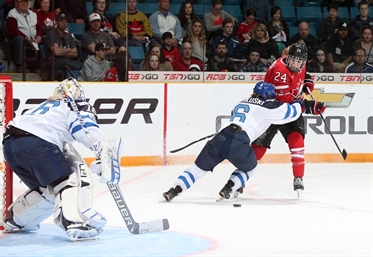Waiting for another upset
Waiting for another upset
North American powers tough to dislodge

 KAMLOOPS, BC - MARCH 31: Finland's Jenni Hiirikoski #6 battles with Canada's Natalie Spooner #24 while Meeri Raisanen #18 looks on during preliminary round action at the 2016 IIHF Ice Hockey Women's World Championship. (Photo by Andre Ringuette/HHOF-IIHF Images)
KAMLOOPS, BC - MARCH 31: Finland's Jenni Hiirikoski #6 battles with Canada's Natalie Spooner #24 while Meeri Raisanen #18 looks on during preliminary round action at the 2016 IIHF Ice Hockey Women's World Championship. (Photo by Andre Ringuette/HHOF-IIHF Images)
Fans of this sport often wonder when it’ll happen again.
As great as the traditional rivalry between the U.S. and Canada is, ultimately different teams will need to battle for gold to maximize fan interest and the development of women’s hockey worldwide.
At the IIHF Women’s World Championship, the North American foes have faced each other in all 16 finals dating back to 1990. And even at the 2006 Olympics, the surprising Swedes didn’t pose much of an obstacle to Canada in the gold medal game, falling 5-1.
Conversely, in Olympic men’s hockey, we’ve seen six different finalists since the NHL began sending its players to the tournament in 1998. The Czech Republic beat Russia in 1998, Canada beat the U.S. in 2002 and 2010, Sweden beat Finland in 2006, and Canada beat Sweden in 2014.
Although there isn’t full-fledged parity in men’s hockey, there’s always a chance that the aforementioned nations – along with Slovakia and Switzerland – could advance to an IIHF gold medal game.
With all that said, it’s worth remembering that we are still in the early stages of women’s hockey history. The 2018 Olympics in PyeongChang, South Korea will be just the sixth for the women.
At the sixth Olympic men’s tournament in St. Moritz, Switzerland in 1948, Canada marched to gold by outscoring its opponents 69-5. And at a time when the NHL was a virtually all-Canadian affair, the motherland of hockey sent the Royal Canadian Air Force (RCAF) Flyers – a senior amateur team – to the Winter Games. Other nations, like second-place Czechoslovakia and third-place Switzerland, sent the best they could muster.
So, these things take time.
Is it time for another upset at the 2016 IIHF World Women’s Championship? The answer is, “Probably not.”
Sunday’s early semi-final pits the defending champion U.S. against Russia for the second straight year. The Americans have won the last three Women’s Worlds meetings by a combined total of 30-3 (9-2, 13-1, 8-0). A Russian upset here would arguably be even more shocking than the 1980 “Miracle on Ice” at the Lake Placid Olympics, where Herb Brooks’s college boys beat the mighty Soviet Union 4-3.
For the Russians, it will be about trying to keep it close before the likes of Hilary Knight, Brianna Decker, and Monique Lamoureux start to fill the net. There is too much American speed and power to contain indefinitely.
The late semi-final at the Sandman Centre sees host Canada taking on Finland. The Finns, who have won more women’s bronze medals than any other nation, have a slightly better chance of shocking the world – but the emphasis is on “slightly.” They have lost all 19 games they’ve played against Canada in Women’s Worlds history, including a 6-1 defeat in Kamloops round-robin play.
The Finns could challenge Canada if goalie Meeri Raisanen stands on her head, if they frustrate the Canadians by clogging up the neutral zone, and if captain Jenni Hiirikoski and star forwards Michelle Karvinen, Riikka Valila, and Tanja Niskanen step up on the power play.
Finnish coach Pasi Mustonen struck an optimistic note about this matchup, dreaming of “one beautiful night” where his team, having “nothing to lose,” inflicts a “catastrophe” on Canada.
But it’s a tall order to defeat the four-time Olympic champions. The skill and experience of captain Marie-Philip Poulin, Rebecca Johnston, and Jennifer Wakefield – to name just a few – should prove insurmountable in the end.
American legend Cammi Granato summed up the challenge that faces the second-tier nations: “Every time a team gets close, I feel like Canada and the U.S. get better. It just comes down to funding and support.”
Once more of those pieces fall into place for Finland, Russia, Sweden, Switzerland, and other countries, we’ll start to see more upsets at this tournament.
Back to Overview

















































